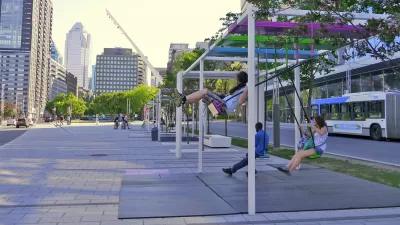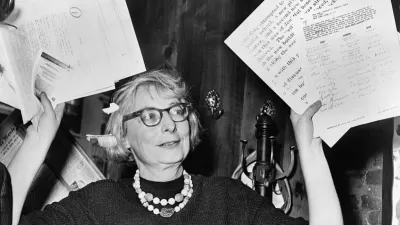This post is sure to inspire debate. The hope, however, is that it will inspire coordination.

"Every profession has its factions," writes Pete Saunders, and planning and urbanism are no different.
But, writes Saunders, "with the way urban planning is taught and understood by laypeople today, it's hard to get an understanding of where exactly people fit in policy debates and when making policy recommendations."
So Saunders describes the lay off the land, after dispensing with the notion that the two factions organizing under the terms New Urbanism and Smart Growth are sufficient to describing the policy landscape. Instead, Saunders groups factions in the following catagories:
- Community and economic development advocates, or CEDers, which "came from the aftermath of the urban unrest of the '60s" and "emphasized the use of federal dollars to aid the residents of distressed communities."
- Suburbanists are "still the largest and most influential faction of the profession," writes Saunders, excelling at "codifying and approving suburban development through zoning and subdivision review."
- YIMBYs (Yes In My Back Yard), which Saunders says grew from New Urbanism, with the "back-to-the-city movement that's driven city revitalization" at its core.
After defining these factions, Saunders wonders if any of them are prepared to deal with the ways the built environment is changing now and how it will change in the future. Instead of focusing too much on their specific causes, "It's really about how they work together," writes Saunders, who provides insights into how these factions might benefit each other to conclude the article.
[Editor's note: this article is from February, but we missed it at the time, and it's of obvious relevance in July 2017, as it will also likely be in December 2017.]
FULL STORY: CEDers, Suburbanists And YIMBYs

Maui's Vacation Rental Debate Turns Ugly
Verbal attacks, misinformation campaigns and fistfights plague a high-stakes debate to convert thousands of vacation rentals into long-term housing.

Planetizen Federal Action Tracker
A weekly monitor of how Trump’s orders and actions are impacting planners and planning in America.

In Urban Planning, AI Prompting Could be the New Design Thinking
Creativity has long been key to great urban design. What if we see AI as our new creative partner?

King County Supportive Housing Program Offers Hope for Unhoused Residents
The county is taking a ‘Housing First’ approach that prioritizes getting people into housing, then offering wraparound supportive services.

Researchers Use AI to Get Clearer Picture of US Housing
Analysts are using artificial intelligence to supercharge their research by allowing them to comb through data faster. Though these AI tools can be error prone, they save time and housing researchers are optimistic about the future.

Making Shared Micromobility More Inclusive
Cities and shared mobility system operators can do more to include people with disabilities in planning and operations, per a new report.
Urban Design for Planners 1: Software Tools
This six-course series explores essential urban design concepts using open source software and equips planners with the tools they need to participate fully in the urban design process.
Planning for Universal Design
Learn the tools for implementing Universal Design in planning regulations.
planning NEXT
Appalachian Highlands Housing Partners
Mpact (founded as Rail~Volution)
City of Camden Redevelopment Agency
City of Astoria
City of Portland
City of Laramie





























